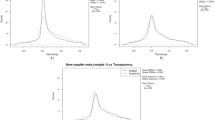Abstract
Firms have to choose their market positions. Suppliers can offer a wide range of services as generalists or they act as specialists by offering a small range of services. In this paper based on Chatain/Zemsky (Manag Sci 53:550–565, 2007) and Chatain (Strateg Manag J 32:76–102, 2011) we analyse how supplier-specific economies of scope generated by investments can compensate the loss occurring by a non-optimal organisational structure (resource configuration) of production. These considerations are modelled by a non-cooperative game with one buyer and two suppliers. We show how the buyer can gain from supplier-specific economies of scope. In this case, the buyer will never split the orders to both suppliers, i.e. he always should order one supplier, if the tasks have similar characteristics and the investment costs of a supplier result in higher specific economies of scope relevant to the choice of the buyer. The amount of the specific economies of scope determines to whom of the suppliers the buyer will place both orders. But, if the investment costs of the suppliers are very high and/or the gains of the buyer are rather low, the pure strategy combination “no investments” for the two suppliers will become the unique Nash equilibrium, whereby the buyer places the two orders each to the supplier who is the specialist for it.



Similar content being viewed by others
References
Adner R, Kapoor R (2010) Value creation in innovation ecosystems: how the structure of technological interdependence affects firm performance in new technology generations. Strateg Manag J 31:306–333
Bennett VM (2013) Organization and bargaining: sales process choice at auto dealerships. Manag Sci 59:2003–2018
Bennett VM, Pierce L (2016) Motivation matters: corporate scope and competition in complementary product markets. Strateg Manag J 37:1304–1315
Brandenburger A, Stuart HW Jr (2007) Biform games. Manag Sci 53:537–549
Brandenburger A, Stuart HW Jr (1996) Value-based business strategy. J Econ Manag Strateg 5:5–24
Chatain O (2011) Value creation, competition, and performance in distributor–supplier relationships. Strateg Manag J 32:76–102
Chatain O, Zemsky P (2007) The horizontal scope of the firm: organizational tradeoffs vs. distributor–supplier relationships. Manag Sci 53:550–565
Dyer JH, Singh H (1998) The relational view: cooperative strategy and sources of interorganizational competitive advantage. Acad Manag Rev 24:660–679
Elfenbien DW, Zenger TR (2013) What is a relationship worth? Repeated exchange and the development and deployment of relational capital. Organ Sci 25:222–244
Fandel G, Trockel J (2016) Investment and lot size planning in a supply chain—coordinating a just-in-time-delivery with a Harris- or a Wagner/Whitin-solution. J Bus Econ 86:173–195
Hotelling H (1929) Stability in competition. Econ J 39:41–57
Jia N (2013) Competition, governance, and relationship-specific investments: theory and implications for strategy. Strateg Manag J 34:1551–1567
Nash J (1951) Non-cooperative games. Ann Math 54:286–295
Panzar JC, Willig RD (1981) Economies of scope. Am Econ Rev 71:268–272
Quintas LG (1989) A note on polymatrix games. Int J Game Theory 18:261–272
Schmidt J, Keil T (2013) What makes a resource valuable? Identifying the drivers of firm-idiosyncratic resource value. Acad Manag Rev 38:206–228
Schmidt J, Makadok R, Keil T (2016) Customer-specific synergies and market convergence. Strateg Manag J 37:870–895
Stuart HW Jr (2016) Value gaps and profitability. Strateg Sci 1:56–70
Author information
Authors and Affiliations
Corresponding author
Rights and permissions
About this article
Cite this article
Fandel, G., Trockel, J. Investments in supplier-specific economies of scope with two different services and different supplier characters: two specialists. Cent Eur J Oper Res 26, 181–192 (2018). https://doi.org/10.1007/s10100-017-0483-x
Published:
Issue Date:
DOI: https://doi.org/10.1007/s10100-017-0483-x




